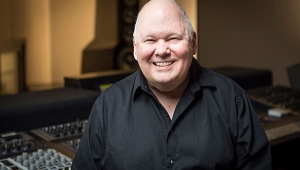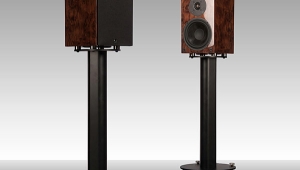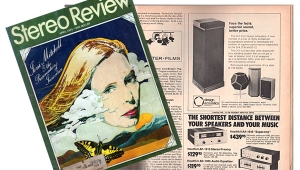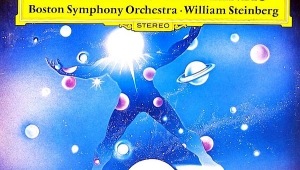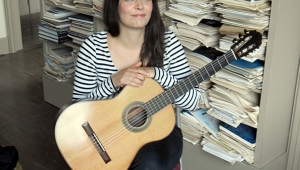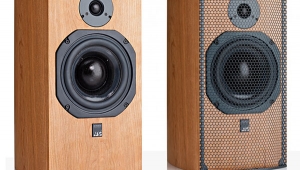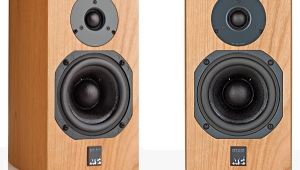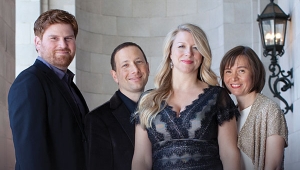| Columns Retired Columns & Blogs |
The Fifth Element #3 Letters
Letters in response appeared in October 2001 (Vol.24 No.10):
A pattern language
Editor: I was delighted to see John Marks' reference to Christopher Alexander's A Pattern Language in the pages of Stereophile ("The Fifth Element," July 2001, pp.37-41). It's a shame that such a seminal book on architecture is so little known, but refreshing to know that, despite observations of American cultural decline in the past century, there are works whose integrity and usefulness will have application and appeal far into the future.
To see A Pattern Language mentioned in your magazine also confirmed a long-held suspicion of mine: that audiophiles share a deep appreciation of other endeavors that, like audio reproduction, lie at the intersection of science and art. In addition to a love of architecture, I also have a passion for collecting black-and-white landscape photography. Many of us—like you, dear Editor—share an enthusiasm for fine automobiles and other expressions that combine man's ingenuity and passion. Enthusiasms for fine food, wine, antiques, and literature come to mind.
When I open your magazine to learn about audio equipment and music and end up also learning about Christopher Alexander and monkey-picked tea (remember that?), I feel I'm part of a discerning community that has dedicated itself to seeking the best that life has to offer. When we share with each other what we've each found in our search, that effort represents the best in us.
So please keep it up! In addition to the debate and acrimony that sometimes threaten to push us apart, perhaps we can also be reminded more frequently of what brings us together within your pages.—Russell Reich, russellreich@rcn.com
The universal language
Editor: I have just finished reading John Marks' July column and I want to share with you my impressions. As he said, there is a physical aspect of our hobby; in a certain way, we love equipment for itself. But the real thing for most of us is the pleasure that we obtain from what that equipment does: reproduce music. The gear and the discs are just a medium to enjoy music. But is the music just a vehicle to the beauty? Where is that beauty, in the music or in the brain of the listener? Or does it lie between them, in the process of listening and enjoying music?
We enjoy music (not just rhythm) per se by means of a cultural pattern developed from the rituals and other social practices to which the music was originally attached (religion, farming, war, etc.). The meaning of music in any cultural tradition is derived from them and the related emotions. The power of music to make us "weak in the knees" depends on its own quality—its form—to express that meaning, and on the capacity (natural and cultivated) of the listener to grasp or be touched by the music, in the experience of listening it.
That is the reason that probably explains why those of us who are not believers can still be profoundly moved by Liszt's Christus or Pärt's Te Deum. The music makes us feel connected to something larger than ourselves—our history, our tradition—and also allows us to escape ourselves, as in a daydream. "Connected rather than overwhelmed...and with some degree of control," Mr. Marks wrote. Sometimes, however, the pleasure lies in being overwhelmed, losing control, and abandoning oneself to the power of music, to its order—being intoxicated, as in a rapture, to attain something like an intuition of the original human experience behind the music. There is no other way to reach the final Beethoven quartets, to feel the composer's deepest sorrow, his resignation and his hope.
I am in this hobby to enhance that faint intuition. With this goal in mind, the equipment is an "open structure." It is subject to changes, modifications in elements and setup, to improve its ability to render the music and "induce an aural experience (sonic and musical) in the listener of what obviously is a reproduction" (as I wrote in "Missing the Points" in "Letters," Stereophile, December 1994, Vol.17 No.12, p.25). I work with my equipment as part of the global process of this pursuit. It is an endless pursuit; because not just the "absolute sound" is always lacking, but that realm—the object of the intuition—is, no matter what I do, never close enough to be perfectly apprehended. In the meantime, the pleasure is great and my toys provide me with a lot of fun.—José Belaunde, El Escorial, Spain. jbelaundeb@inicia.es>
Thank you, José, for your thoughtful letter. I am very much in admiration of your phrase "I am in this hobby to enhance that faint intuition." It makes me think of Shelley's "Rarely, rarely comest thou Spirit of Delight!"
I am a Christian neo-Platonist (of sorts), so I believe that the beauty exists objectively in the music—independent of its being perceived. However, as I also have phenomenological leanings, I do agree that there is a dynamic aspect to perception.
I would agree that certain aspects of musical meaning are culturally determined. If a rock band such as Queen uses the rhythmic motto of the opening of Beethoven's Symphony 5, they are making a statement within a certain cultural framework (as well as making a statement about their own pomposity and lack of taste). But I also believe that other aspects of musical meaning are not culturally determined, but rather necessarily implied by our essential nature as humans. These aspects for which I would claim universality may be few but they are fundamental, by which I mean hardwired into our perceptual apparatus.
I think that we can agree that most humans have two eyes that point frontward and two ears that point sideways. I think that we can also agree that this is not "accidental" or random. Were that the case, some people would have eyes on the sides of their heads and ears in front. So, either God intended that humans perceive visually comparatively narrowly what is in "front" of them and perceive aurally comparatively widely what is on either side, with neural processing filling in the illusion of front and back sonic perception, or there was an evolutionary advantage to this disposition of cells rather than another.
Having eyes in front allows us depth perception and allows us to do fine work in front of us. Having ears on the side allows us to hear danger to ourselves and others in as wide a compass as possible. I think that there can be near universal agreement on these points.
Where I go beyond the realm of near-universal agreement (but by no means go alone) is in asserting that the human physiological and emotional response to certain auditory stimuli is universal. Sharp noises excite the fight-or-flight syndrome. Again, not much to argue with there, and its relevance to music is not that great a revelation.
However, what about the assertion that there is a universal hardwired human response to the sounds made by a lost or threatened toddler or infant? If you are taking a walk in the woods and hear what sounds like a baby scream in fright, you tend to put aside other thoughts and try to find out what is going on. Opera composers usually can be counted on to exploit this emotional reaction...except that in opera, it is called the big soprano aria.
Although tunings and tonalities do tend to become more sophisticated as cultures demand more from their music, the "rightness" of octave consonance is hardwired in the structure of the inner ear, and fundamental intervals such as the minor third occur in nature all the time, such as in bird calls.
It is a commonplace to say that the only cultural universal is the universality of culture, but I believe that, above and beyond that, fundamental aspects of all worthwhile music make connection with aspects of our humanity that are hardwired to receive them. Willful disregard of this leads to music that is often not worth listening to, but just as surely, loading up a score with a lot of fundamental intervals does not guarantee worthwhile music either.—John Marks
The language of music
Editor: Certainly there is a natural element in music, both physical and biological. Ernest Ansermet contended that there is an a priori acoustical structure in the human mind that finds tonality in the natural order. Similarly, Arnheim's gestalt theory asserts that music embodies expressive capacity inherent in the relations of the tones and rhythms and their derived tensions. Bernstein's Norton Lectures are well-known for their defense of the universality of certain phrases, intervals, and harmonies. But as Anthony Storr has shown in his Music and the Mind, that degree of universality is not enough to establish beyond dispute that the Western tonal system has strong links with natural phenomena.
Even if all mankind reacts in a similar way to a baby's scream as a natural mechanism to protect their offspring, this does not mean that all mankind could enjoy a "big soprano aria." Evolution and history—and biography as well—are powerful dividing forces.
It is probably true that "fundamental aspects of all worthwhile music make connection with aspects of our humanity that are hardwired to receive them. Willful disregard of this leads to music that is often not worth listening to." I have emphasized "receive" because I believe, following Charles Rosen's ideas, that the process is more active than passive. The listener has to put intensity, understanding, love, and a ludic attitude into the act of listening to music in order to receive it and acknowledge its worth. However, the main issue at this point is the relation between this hypothetical hardwiredness and the music worth listening to. Is this hardwiredness a "natural constriction of music" (Adorno's words) that frees us of the obligation to listen to everything in music (Thomas Mann)? If so, almost all contemporary music could be intrinsically worthless, being a violation of the natural musical order and thus inaccessible to the ear.
I am inclined to think that the mind's acoustical a priori—if it exists—is less strong than our musical tradition has led us to believe. It is this tradition that is strong, our ears are formed by it to the degree that we feel it as natural. But as David Hume has taught us, we call "natural" all convention founded in what seems a long and unchanged historical experience. And one of the requisites Hume established for an appropriate assessment of a piece of art is to go out of our natural position (personal circumstances and prejudices). Which means that we must be open to experiment without restrictions and follow the music instead of nature. This is the challenge.
We audiophiles have a privileged starting position because we deal in our hobby with artifacts: reproduced music. We can surround ourselves (in stereo, for the purist) with any kind of music on disc and play it again and again in the best sonic circumstances that our bank account can afford. We can undertake at will musical safaris almost without risk. We can immerse and initiate ourselves in any kind of music and learn to get pleasure of them in the most comfortable situation: our living rooms or dedicated listening rooms. If we want and try hard, we can reshape and expand to some extent our cultural pattern and find one day that we can be delighted by Boulez's music, for example, and make true what the philosopher of music Adorno envisioned: be emancipated from the "natural constriction of music." Our worshipping of an idol, the sound, could paradoxically be the key to this new freedom.—José Belaunde, El Escorial, Spain, jbelaundeb@inicia.es
- Log in or register to post comments
